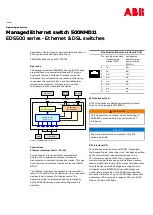
Table 284: RADIUS Server Status Fields
Field
Description
Current
An asterisk (*) in the column Indicates that the server is the current server for the
authentication server group. If no asterisk is present, the server is a backup server.
If more than one RADIUS server is configured with the same name, the switch selects one of
the servers to be the current server from the group of servers with the same name.
When the switch sends a RADIUS request to the named server, the request is directed to the
server selected as the current server. Initially the primary server is selected as the current
server. If the primary server fails, one of the other servers becomes the current server.
RADIUS Server Host
Address
Shows the IP address of the RADIUS server.
RADIUS Server
Name
Shows the RADIUS server name. Multiple RADIUS servers can have the same name. In this
case, RADIUS clients can use RADIUS servers with the same name as backups for each
other.
Port Number
Identifies the authentication port the server uses to verify the RADIUS server authentication.
The port is a UDP port.
Server Type
Shows whether the server is a Primary or Secondary server.
Secret Configured
Whether the shared secret for this server has been configured.
Message
Authenticator
Shows whether the message authenticator attribute for the selected server is enabled or
disabled.
Click
Refresh
to update the page with the most current information.
Server Statistics
Use the RADIUS Server Statistics page to view statistical information for each
server configured
on the system.
To access this page, click
Security
>
RADIUS
>
Statistics
in the navigation menu.
Table 285: RADIUS Server Statistics Fields
Field
Description
IP Address/Host Name
The IP address or host name of the RADIUS server associated with the rest of the
data in the row. When viewing the detailed statistics for a RADIUS server, this
field identifies the RADIUS server.
Round Trip Time
The time interval, in hundredths of a second, between the most recent Access-
Reply/Access-Challenge and the Access-Request that matched it from the
RADIUS authentication server.
Access Requests
The number of RADIUS Access-Request packets sent to the server. This number
does not include retransmissions.
Access Rejects
The number of RADIUS Access-Reject packets, including both valid and invalid
packets, that were received from the server.
Pending Requests
The number of RADIUS Access-Request packets destined for the server that
have not yet timed out or received a response.
Timeouts
The number of times a response was not received from the server within the
configured timeout value.
Managing Device Security
ExtremeSwitching 200 Series: Administration Guide
286
















































